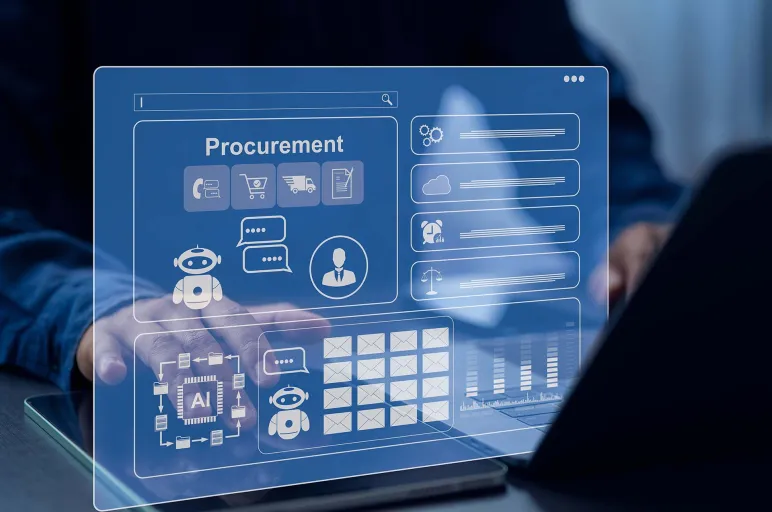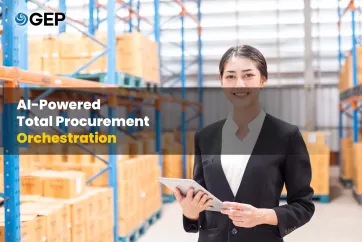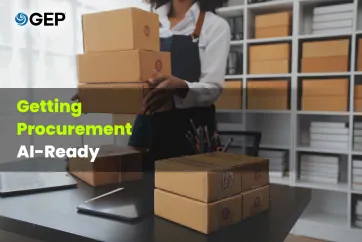
AI Agents Enter Procurement Mainstream, Finds Economist Survey
- AI is set to make a significant impact on procurement and supply chain operations.
- Many businesses are adopting an incremental approach to test where AI can add the most value.
- Starting small and achieving quick wins can help build trust and gain management buy-in for bigger, complex projects.
September 23, 2025 | Procurement Software 4 minutes read
How is the adoption of AI impacting procurement operations? The answer may surprise those who thought this technology would have limited impact.
AI tools are already performing an increasing number of tasks across procurement and supply chain operations. In fact, the conversation has now moved to the next phase: AI agents.
For companies, the question is not whether to use AI agents, but how and where to use them – and, importantly, how much control to give them.
Christopher Sawchuk, principal and global procurement advisory practice leader at the Hackett Group believes that with AI, procurement leaders recognize the opportunity to rethink, reconsider and re-architect their operating model. They know this is a massive disruptive change that is impacting all dimensions of the operating model in supply management including the vision and objectives of the function, he says in a recent GEP webcast.
With autonomous agents, it goes beyond automation. These agents can make decisions, take actions, and pursue goals independently, opening up a world of opportunities and possibilities in procurement – across contract management, category and supplier management, sourcing, procure-to-pay, risk management, and more.
Individual agents improve efficiency, but the use of a multi-agent system – where multiple agents each specialised in different functions collaborate and coordinate with one another, working in sync – is transformative. It creates a smooth, agile procurement workflow driving faster outcomes and greater value.
For instance, when a contract management agent flags an upcoming expiry or a critical milestone, that data flows to sourcing agents that then recommend optimal paths and best award scenarios, initiate bid and negotiation plans. Once sourcing progresses, supplier management agents ensure vendors are verified, set up, and the system has reliable third-party data. Each agent builds on the actions of the others, creating a seamless and efficient procurement workflow.
Struggling to Identify AI Use Cases in Procurement?
Connect with a digital transformation expert at GEP
Where AI Agents are Making Initial Impact
Organizations are trying out AI agents across a wide range of procurement tasks, according to an Economist Impact survey (of over 400 executives in the U.S. and Europe conducted earlier in 2025). About 40% of companies are already using agentic AI in some cross-functional capacity.
Think big, start small, seems to be the mantra for all but the most advanced organizations. There are several reasons businesses are taking an incremental approach:
• Companies Are Establishing Value
Many firms are still figuring out where AI agents can deliver the most value in their procurement and supply chain operations. They are introducing agents incrementally across different areas to test where they truly value-add.
Organizations are most confident about deploying AI agents where the processes are structured and rules based, such as supplier onboarding, query management, performance monitoring, compliance tracking, invoice automation, helpdesk support, and order processing, among others. Their predictable workflows with standardized data and minimal need for human judgment are what companies are picking for AI agents. Around 60% of firms plan to use AI agents in these areas, according to the Economist Impact survey.
• Quick Wins That Drive Buy-In
Even when the value is clear, the effort required to implement a multiagent network to handle different procurement functions at scale is significant. It requires seamless integration, robust data infrastructure, and meticulous planning. It’s simpler to start small and opt for isolated pilots that will give quick wins and earn management buy-in rather than adopt a complex multi-agent solution across operations.
• Bridging the Talent Gap
Many firms currently don’t have the in-house expertise required to help identify, deploy, use and manage advanced systems like agentic AI. Companies have already started addressing this skills gap with reskilling programs. They still need to invest considerable amount of time and effort into training their employees to get the most out of the technology and implement it on a scale.
• Concerns about Data Security
Companies will take time to choose a suitable and trusted technology partner who not only delivers what is needed but also guarantees data security and privacy. Many organizations have concerns that sensitive commercial information will get exposed when AI agents interact with external partners, for example, while processing and analyzing supplier contracts, pricing, and performance data. Nearly half of the firms surveyed by the Economist Impact have data security concerns. One way companies are trying to address their data concern is by keeping AI agents siloed. Once organizations find a trusted provider, they are more likely to consider a multiagent framework.
The Agentic AI Playbook for Procurement Pros
How to Move from Hype to Action and Results
The Hybrid Model with a Human in the Loop
As organizations debate and explore what tasks AI agents would be best suited for and what they can be entrusted with, the one thing that stands out is that firms are leaning toward a hybrid approach. That is, they support a human-in-the-loop model rather than a fully AI-driven procurement workflow. Experience, intuition and judgment are valued high, and the goal is to combine AI-driven automation with human oversight for stronger collaboration, greater agility, and better results.
We are going to see more autonomy as the trust with AI grows over time, says Chris Sawchuk of the Hackett Group. While procurement leaders are beginning to have confidence in the intelligence provided by technology, building trust takes time, he says.
Nonetheless, one thing is clear from this discussion. Businesses that understand how to fully leverage AI and derive maximum value are going to thrive in an increasingly complex and uncertain business environment.
Read the full report: https://www.gep.com/research-reports/how-far-will-ai-agents-go



